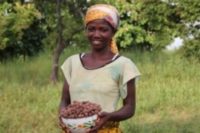The Hershey Co. soon will add disease prevention, cell phones for women farmers and solar chargers to its list of things the CocoaLink network provides.
The new features for the network, which was launched in July, now includes:
• a partnership with the nonprofit organization Malaria No More - part of a global effort that seeks to end malaria deaths in Africa by 2015 - to leverage CocoaLink’s connection to rural cocoa villages.
• an internal smart phone recycling program. Through the program, more than 500 smart phones no longer being used by Hershey’s U.S. employees willl be redeployed to women across Ghanaian cocoa communities by the end of the year to bridge a gender gap in mobile handset ownership.
“CocoaLink: Connecting Cocoa Communities” is a unique farmer outreach program developed by Hershey, the World Cocoa Foundation and the Ghana Cocoa Board. It uses mobile voice and SMS text messages delivered in local languages or English to connect cocoa farmers with information about improving farming practices, farm safety, child labor, health, crop disease prevention, post-harvest production and crop marketing.
CocoaLink community trainers already have enrolled more than 2,500 farmers, putting the program on track to directly reach more than 8,000 Ghanaian cocoa farmers and community members by next year.
Responses from early participants are encouraging.
“I have registered with my husband’s phone number and when I get the message, my children can help me read it out. When I have a problem on the farm I can text or call for help and they will come to help me. I’m expecting that it will help us in the community,” says farmer Vida Annoh, Kojokrom, Sefwi Akontonbra District.
And Aseadu Kwarteng, a farmer in Asanteman, Sefwi Akontonbra District, echoes that sentiment.
“I know that CocoaLink will add more improvement to my life as a farmer,” Kwarteng says. “I have registered and so have other community members. My prayer is that the program will stay with us here in the communities.”
Malaria Prevention
As part of the new features, CocoaLink will join Malaria No More’s NightWatch program, which focuses on increasing the use of mosquito nets in malaria-endemic communities. NightWatch is a communications campaign that broadcasts messages each night at 9 p.m., the time that malarial mosquitoes come out.
The messages remind people to sleep under their mosquito nets and include information about healthy behaviors, such as the need to seek prompt malaria testing and treatment. Hershey and its CocoaLink partners will include NightWatch malaria prevention messages in its ongoing series of SMS texts to cocoa farmers.
“By partnering with Malaria No More, we will be able to provide families with valuable information that can save lives and reduce suffering,” says Andy McCormick, v.p. of public affairs, for Hershey. “CocoaLink is a natural extension of Malaria No More’s commitment to connect families through new and emerging communications technology.”
And, Kate Campana, managing director of impact programs for Malaria No More, hopes the new partnership, “will send a powerful message about the importance of preventing malaria, especially among young children.”
"It is encouraging to see CocoaLink growing to include malaria education for farming families,” says Bill Guyton, World Cocoa Foundation president. “The WCF ECHOES Alliance aims to strengthen cocoa-growing communities through a comprehensive approach including functional literacy and agricultural skills training, as well as practical life skills training about HIV/AIDS and malaria."
Focus on Women Farmers
As part of its efforts to reach women farmers, CocoaLink recently became one of the first company programs to be endorsed by the U.S. Department of Labor as part of its $17-million Framework of Action campaign to combat the worst forms of child labor in Ghana and the Ivory Coast.
The Hershey Co. is a founding partner and a sponsor of the Framework of Action.
The CocoaLink program expansion will benefit families in cocoa communities, especially women and children.
Today, Ghana’s mobile phone coverage spans more than 85% of the country and more than 65% of rural residents have access to mobile phones. However, because fewer than half of the women in the 15 CocoaLink villages have their own phones, Hershey will provide an initial 150 mobile phones to women farmers, using reconfigured phones collected from its employees.
While mobile phones have become commonplace in rural cocoa communities, reliable access to electricity poses a challenge to many rural phone owners.
Madeleine Blommer, a member of the Blommer Chocolate Co. family, the largest cocoa bean processor in North America, has contributed solar chargers to help ease this problem. And, Hershey and its CocoaLink partners will utilize the CocoaLink network of trainers and community leaders to help distribute the solar chargers.
CocoaLink’s local trainers are also part of the successful WCF ECHOES Alliance’ functional literacy and numeracy training program, another on-the-ground program in which Hershey is actively involved. Solar chargers will also be distributed by Peace Corp volunteers, helping with CocoaLink farmer training and implementation.
For more information on CocoaLink, visit: http://www.worldcocoafoundation.org/what-we-do/current-programs/CocoaLink.asp


